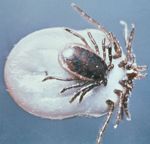Difference between revisions of "Tick Life Cycle"
Jump to navigation
Jump to search
(Created page with 'thumb|right|150px|''Ixodes ricinus'' mating - Wikimedia Commons *Ticks are temporary parasites so only spend a short period of their lives on the host …') |
|||
| (14 intermediate revisions by 3 users not shown) | |||
| Line 1: | Line 1: | ||
| − | |||
[[Image:Ticks mating.jpg|thumb|right|150px|''Ixodes ricinus'' mating - Wikimedia Commons]] | [[Image:Ticks mating.jpg|thumb|right|150px|''Ixodes ricinus'' mating - Wikimedia Commons]] | ||
| − | + | *Ticks are temporary parasites so only spend a short period of their lives on the host species | |
| − | + | *When larvae are seeking a host they are known as '''seed ticks''' | |
| − | |||
| − | + | *Both hard and soft ticks have the same life cycle | |
| − | + | **Egg → larva → nymph → adult | |
| − | + | *Soft ticks feed little and often and on '''many hosts''' | |
| − | |||
| − | |||
| − | |||
| − | + | '''Hard ticks''' | |
| − | + | *Classified depending on the number of host species they parasitise during their life cycle | |
| − | + | *Take one blood meal at each life cycle stage which lasts several days | |
| − | |||
| − | + | *'''One-host ticks''' | |
| − | + | **Each stage feeds and develops on one host (the same host) | |
| − | + | **E.g. ''Boophillus spp.'' | |
| − | |||
| + | *'''Two-host ticks''' | ||
| + | **Larvae and nymphs feed on one host | ||
| + | **Adults feed on a second host | ||
| + | **E.g. ''Hyalomma'' | ||
| − | + | *'''Three-host ticks''' | |
| − | + | **Each stage feeds and develops on a different host | |
| − | + | **E.g. ''Ixodes spp.''[[Category:Ticks]] | |
| − | |||
| − | |||
| − | [[Category:Ticks | ||
| − | |||
| − | |||
| − | |||
Revision as of 21:54, 18 May 2010
- Ticks are temporary parasites so only spend a short period of their lives on the host species
- When larvae are seeking a host they are known as seed ticks
- Both hard and soft ticks have the same life cycle
- Egg → larva → nymph → adult
- Soft ticks feed little and often and on many hosts
Hard ticks
- Classified depending on the number of host species they parasitise during their life cycle
- Take one blood meal at each life cycle stage which lasts several days
- One-host ticks
- Each stage feeds and develops on one host (the same host)
- E.g. Boophillus spp.
- Two-host ticks
- Larvae and nymphs feed on one host
- Adults feed on a second host
- E.g. Hyalomma
- Three-host ticks
- Each stage feeds and develops on a different host
- E.g. Ixodes spp.
